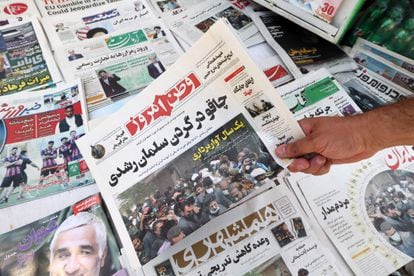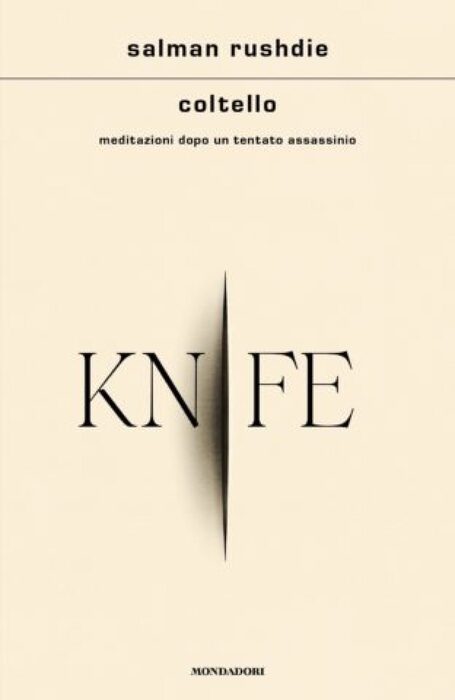The detainee for the stabbing of writer Salman Rushdie has been charged with attempted murder and is being held without bail, the Chautauqua County Prosecutor's Office reported Saturday, where the author was stabbed on Friday.
Hadi Matar, a 24-year-old man from Fairview, New Jersey, is charged with attempted murder and assault, County Attorney Jason Schmidt's office said in a statement.
Schmidt said state and federal law enforcement agencies, also in New Jersey, were working to unravel the planning and preparation of the attack to determine whether to file additional charges.
The British writer of Indian origin Salman Rushdie, stabbed during a conference in Chaupauqua (New York), remained this Saturday connected to a respirator in a hospital in Erie (Pennsylvania), where he was transferred after the attack and intervened for hours.
According to his literary agent, the almighty Andrew Wylie, the prognosis for his evolution is not good.
“Salman will probably lose an eye;
nerves in his arm were severed and his liver was damaged from the stab wounds,” Wylie reported Friday night.
The prolonged threat of the theocratic regime in Iran, which in 1989 sentenced Rushdie to death for blasphemy for his novel
The Satanic Verses
, has finally made the author the umpteenth victim of freedom of expression.
Rushdie had managed to dodge the fundamentalist fury for 33 years, until a young man named Hadi Matar pounced on him, repeatedly stabbing him in the neck and abdomen, on the stage of a specialized Chaupauqua cultural center, ironies of fate , in reception and residency programs for threatened writers.
The theme of Rushdie's last conference before the attack was precisely the role of the United States as a safe haven for persecuted perpetrators.
Although the New York authorities decline to comment on the author's nationality and other information and, for the moment, not on his motives either, the Islamist expert Romain Caillet said on Twitter that Matar is of Lebanese origin and a follower of the Hezbollah Shiite militia party. pro-Iranian
In the Iranian media the news was greeted with jubilation.
"A Lebanese hero," the
Iranian portal in Arabic
called the aggressor in a tweet that was later deleted.
From Beirut, a Hezbollah spokesman said on Saturday that the group knows nothing of the attack.
Caillet explained, however, that Matar was using a fake New Jersey driver's license in the name of Hassan Mughniyah.
Imad Mughniyah was a security chief and one of the most important Hezbollah commanders, eliminated by Israel in Damascus in 2008.
Front page of the Iranian daily 'Vatan-e Emrooz' this Saturday, with the headline: "A knife in Salman Rushdie's neck." ATTA KENARE (AFP)
Born in Bombay (India) 75 years ago into a wealthy Muslim family - a religion he renounced until he defined himself as a militant atheist - Rushdie moved to England to study, graduating from Cambridge.
In 1964 he acquired British nationality.
The writer owes his reputation to his second book,
Midnight's Children
(1981), a great ensemble novel about post-independence India.
The midnight of the title refers to that of August 15, 1947, when the separation from the British was consummated and also the traumatic and painful partition of Pakistan.
The book won the Booker Prize in 1981.
After several forays into narrative, journalism and essays, the publication of
The Satanic Verses
in 1988 placed him in the eye of the hurricane due to the fatwa (religious decree) issued by Ayatollah Ruhollah Khomeini.
The novel portrays the Muslim immigrant experience in Britain, and in particular the tension between secular and religious ways of thinking, between modernity and tradition.
The treatment of one of the characters, identified by his critics as the Prophet Muhammad, was considered disrespectful and several Muslim countries banned the publication of the work.
In early 1989, a group of Muslims in Bradford burned the book in public as part of a campaign to ban it in the UK.
In February of that year, Grand Ayatollah Khomeini, the country's spiritual leader, issued the fatwa, which demanded the author's death as impious.
Subsequently, Iran offered a reward to the executor of the sentence that eventually exceeded three million dollars (2.9 million euros).
Rushdie was forced to live in hiding, with permanent police protection, for nearly a decade, until he defied fear and returned to a normal life, residing in the US since 2000.
The writer Ayad Akhtar, president of PEN America, said this Friday that he never saw Rushdie with bodyguards, neither in the theater, nor in restaurants, nor in cultural events such as the one that ended in the brutal attack that has taken him to the hospital;
in recent years, moreover, he had multiplied his outings.
Akhtar noted that he and Rushdie, who once also chaired the PEN Club, never discussed the threats, and that the novelist seemed comfortable in public.
On the scene of the Chaupauqua cultural center there were two agents of the security forces, who arrested the aggressor.
That Rushdie was able to overcome fear does not imply that the threat lost its force.
On the contrary, after the condemnation of Ayatollah Khomeini, the main architect of the Islamic revolution of 1979, the fatwa left a trail of blood around the world.
At least 45 people were killed in protests over the book's publication, including 12 people in Rushdie's hometown.
In 1991, a Japanese translator of the play was stabbed to death, a crime that has yet to be solved, and an Italian translator survived a knife attack.
In 1993, the Norwegian publisher was shot three times, although he survived.
We would have to wait until the wave of protests triggered by the so-called Muhammad cartoons in 2006 to witness another episode of religious hysteria like the one that followed Rushdie's book.
Cases similar to yours
Eternal contender for the Nobel Prize for Literature, stubborn champion of freedom of expression against any type of fundamentalism, Rushdie continued to live as a celebrity who seemed to attract the spotlight, disdaining a threat that was more deaf every day.
But, despite the fact that relations between the United Kingdom and Iran returned to a certain level of normality after Khomeini's death in 1989, the fatwa remained in force.
Khomeini's successor, Grand Ayatollah Ali Khamenei, never revoked it, and ten years had to pass, until 1998, when, after arduous diplomatic negotiations between London and Tehran, the theocratic regime formally disassociated itself from the sentence.
Rushdie, meanwhile, had shown a conciliatory spirit, with certain concessions to his critics: he met privately with some British Muslim leaders, to whom he said that he accepted the basic principles of Islam, and even proposed not to publish
The Satanic Verses
in an edition of pocket.
He later admitted that his conversion had been the product of desperation, not faith, and settled into a religious denialism that made him a "hardline atheist."
But the threat was still there, with new institutions contributing to the $3 million bounty on his head.
In 2016, dozens of regime media contributed $300,000 to the cause.
The messages from Tehran were misleading to say the least.
As the years passed, the authorities began to hint that the sentence would not be carried out, while insisting that, theologically speaking, a fatwa is never revoked.
Beginning in 1998, after the Iranian theocracy formally disassociated itself from the conviction, Salman Rushdie resumed the conventional life of a literary celebrity.
Until this Friday in the idyllic rural town of Chaupauqua, a haven of peace that serves as a refuge for authors, like him, who are threatened.
Follow all the international information on
and
, or in
our weekly newsletter
.







